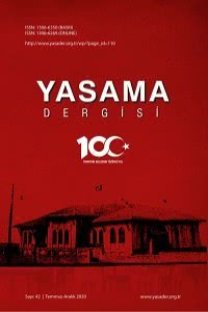Ürdün’de Arap Baharı
Orta Doğu ve Kuzey Afrika coğrafyasında yaşanan çalkantılardan Ürdünde etkilenmiştir. Arap Baharı olarak adlandırılan bu olaylar kapsamında monarşi ile yönetilen ülkelerde rejim değişikliği yaşanmamıştır. Bölgede devrilen otoriter yapıların aksine Ürdün monarşisinin meşruiyeti geniş çaplı sorgulanmamıştır. Bu nedenle Ürdün’de gösteriler kapsam ve sonuçları açısından sınırlı kalmış ve Ürdün Haşimi Krallığı protesto gösterilerini siyasi ve ekonomikvaatler vererek atlatabilmiştir. Kötü ekonomik durum, işsizlik ve yolsuzlukiddiaları gösterilerin belirgin sebepleri olsa da demokratikleşme yönündeadımlar talep edilmiştir. Ürdün’de uzun vadede istikrarın sağlanması meşrutiyet yönünde atılacak adımlara bağlı gözükmektedir. Bu çalışmada, gösterilerinardındaki temel sosyo-ekonomik ve siyasî sebepler, halkın yönetimden talepleri, Kral II. Abdullah yönetiminin gösterilere karşı tepkisi ve uluslararasıboyut ele alınmaktadır
Jordan has been affected by the turmoils that have taken place in the geography of Middle East and North Africa. Regime change has not taken place incountries where monarchies rule with in the context of these event scalledArab Spring. Unlike the toppledaut horitarian structures in there gionthelegality of Jordanian monarchy has not been widely contested. Hence protests inJordan have been limited in scope and result and the Hashemite Kingdom ofJordan has been able to overcome the protests by giving political and economic promises. Although bad economic condition, unemployment and corruption allegations have been the apparent reasons of the protests stepstowards democratization have been demanded. It seems that the long term stability in Jordan depends on the steps to be taken towards constitutional monarchy. In this study, basic socio-economic and political reasons behind protests,public demands from the regime, the reaction of King Abdullah II’s ruleagainst protests, and international dimension are dealt with
___
- BBC, “Jordan protests: King Abdullah names Marouf Bakhit PM”. February 01, 2011, http://www.bbc.co.uk/news/world-middle-east-12336960
- CIA, the World Factbook, https://www.cia.gov/library/publications/the-world- factbook/geos/jo.html
- Köprülü, Nur. (2012). “Monarchical Pluralism or De-democratization: Actors and Choices in Jordan”. Insight Turkey, 2012 (14:1): 71-92.
- Moon, Younghoon. “Democracy on the Horizon: How the Arab Spring is Unfol- ding in Jordan”. Harvard International Review, (Spring 2012): 28-31.
- Samann, J.ean-Loup. “Jordan’s New Geopolitics”. Survival: Global Politics and Strategy, 2012 (54:2): 15-26.
- Satkowski, Christina A. and Hassan A. Barari. “The Arab Spring: The Case of Jordan”. Ortadoğu Etütleri, 2012 (3:2): 41-57.
- Tobin, Sarah A. “Jordan’s Arab Spring: The Middle Class and Anti-Revolution”. Middle East Policy, 2012 (19:1): 96-109.
- Turkish Policy Quarterly, “Interview with King Abdullah II”, (February 2012), http://www.turkishpolicy.com/dosyalar/files/interview_king_abdullah- 10_4%281%29.pdf
